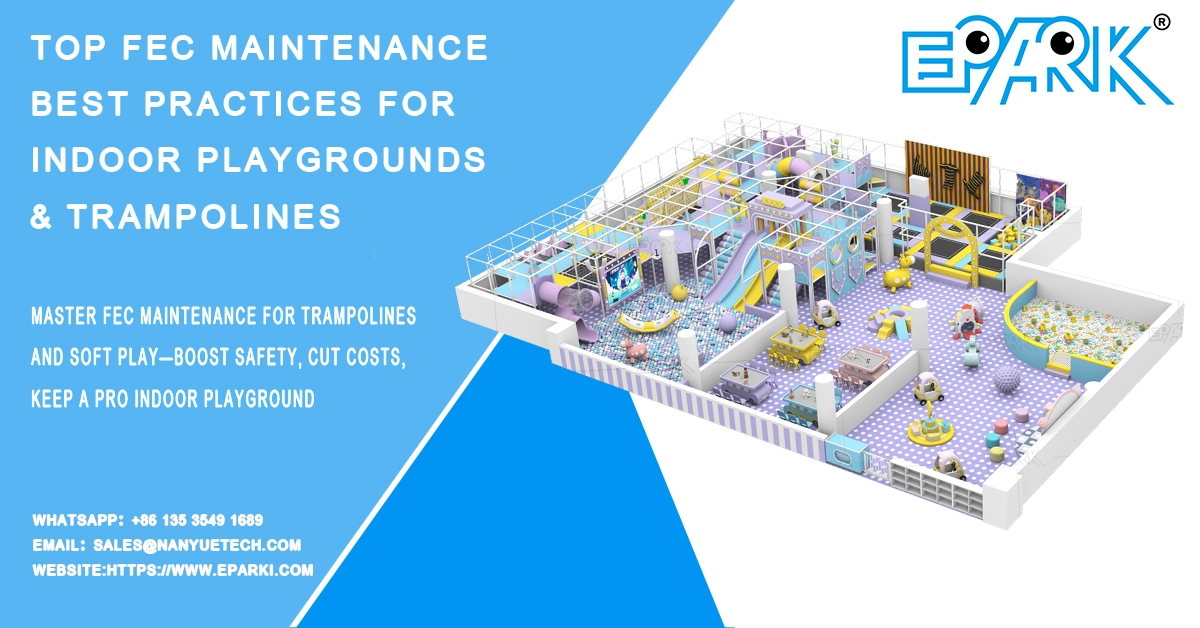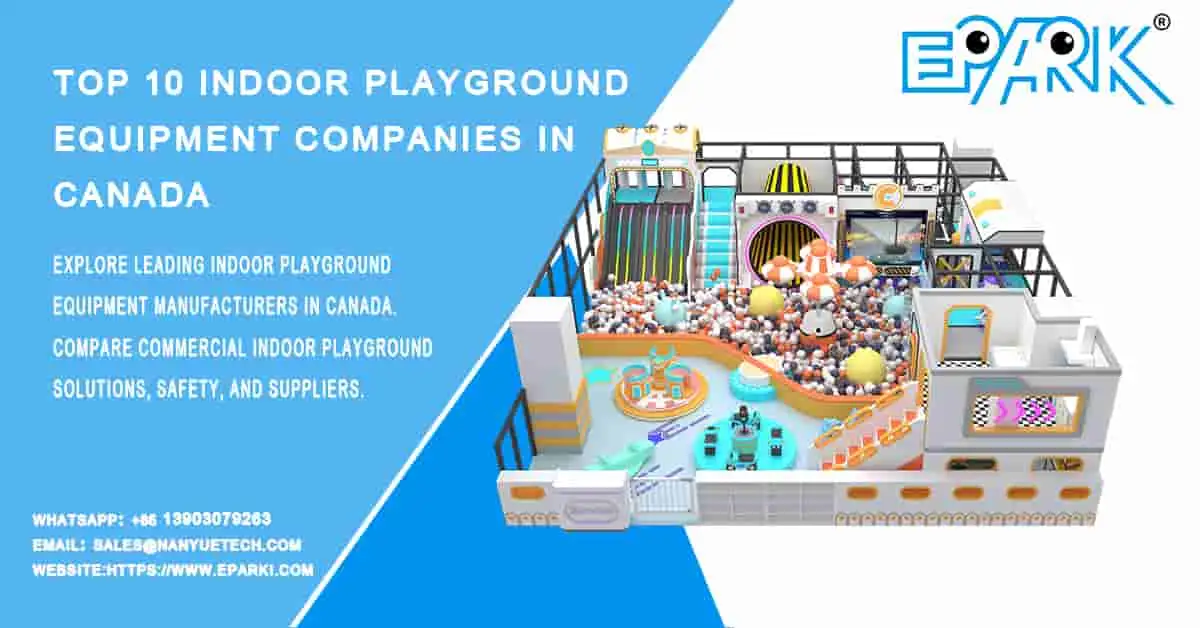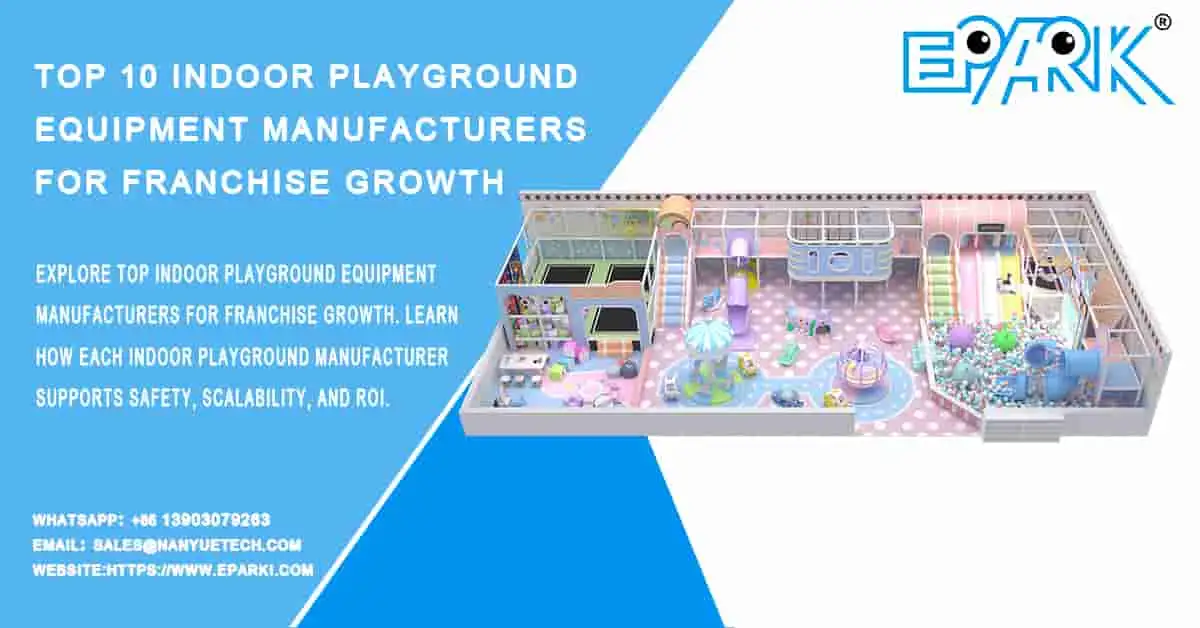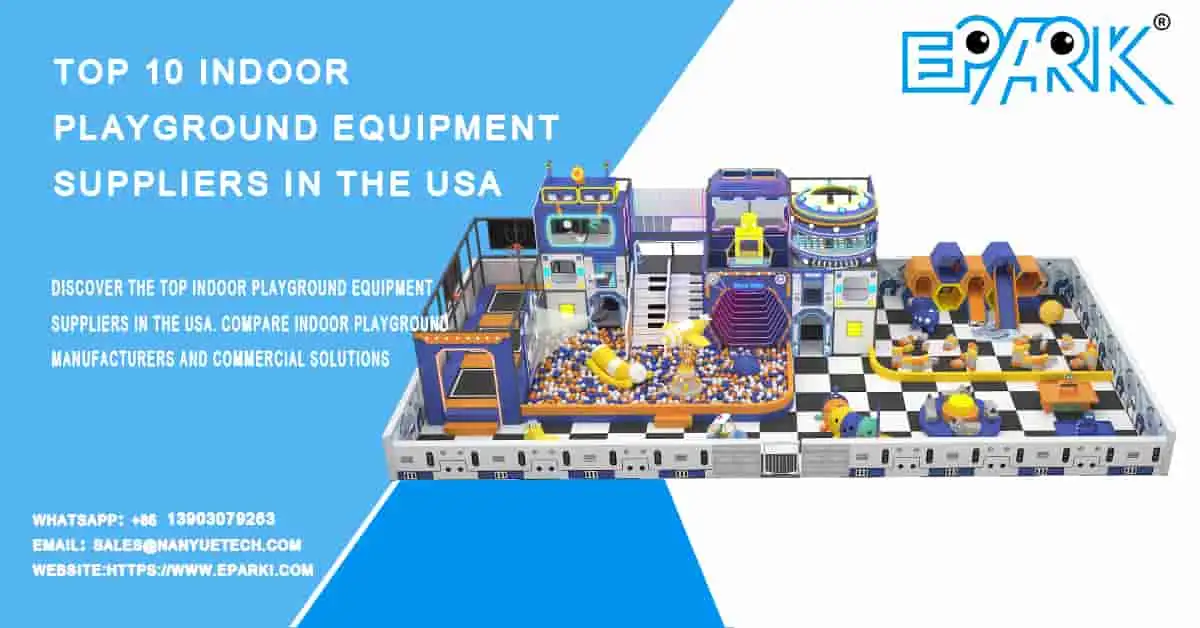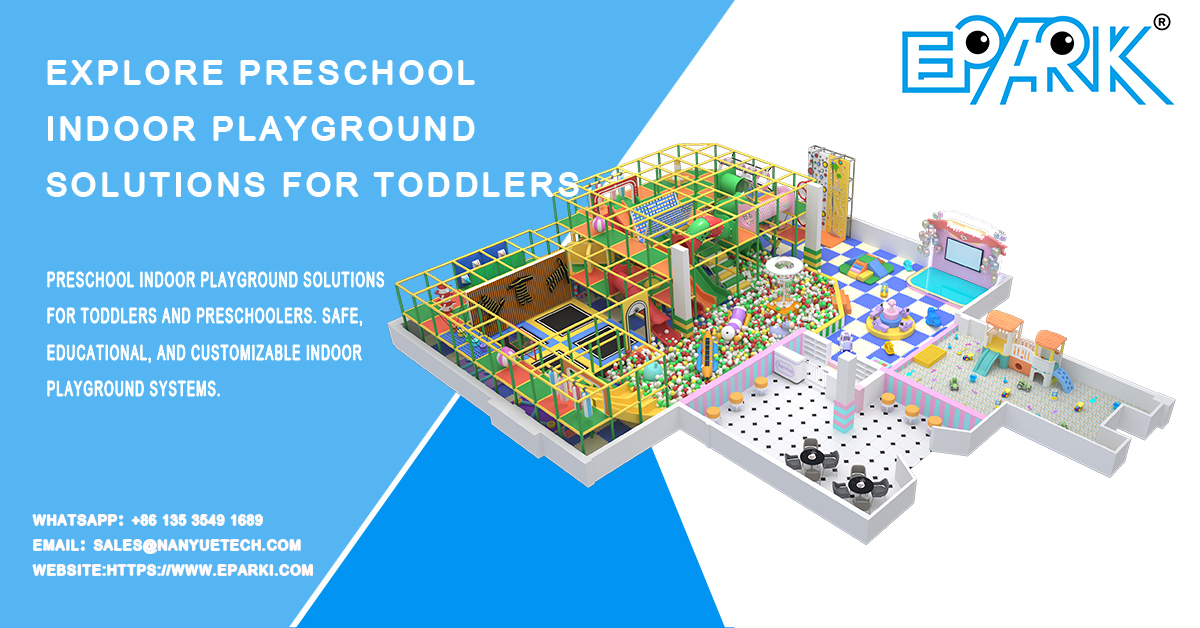FEC Maintenance Best Practices: Maximize Safety, Longevity & Profits
Maintaining a Family Entertainment Center (FEC) is essential for operators and B2B buyers looking to maximize the longevity of their assets. Proper FEC maintenance best practices not only protect visitors but also prevent costly repairs and enhance customer satisfaction. Neglecting routine maintenance can lead to accidents, shortened equipment lifespan, and lost revenue.
For indoor playground manufacturers and operators, following structured maintenance protocols ensures that soft play areas, trampoline parks, and arcade machines remain safe, functional, and attractive. This guide covers everything from daily inspections to detailed equipment checks, helping you maintain a high-quality facility.
Why Regular Maintenance Matters for FECs
Safety First
Safety is the primary concern in any indoor playground or trampoline park. Equipment like trampolines, slides, and climbing frames undergo continuous stress and high user loads. Without regular checks, structural weaknesses or torn mats can lead to injuries. Following FEC maintenance best practices ensures compliance with standards like ASTM F1487 (playground equipment safety) and EN 1176 (European indoor play safety).
Protect Your Investment
Equipment in a trampoline park or soft play area represents a significant investment. Preventive maintenance can reduce repair costs by up to 30% annually, according to industry benchmarks. Regular inspections of mats, springs, and soft surfaces extend equipment life, protecting your financial investment.
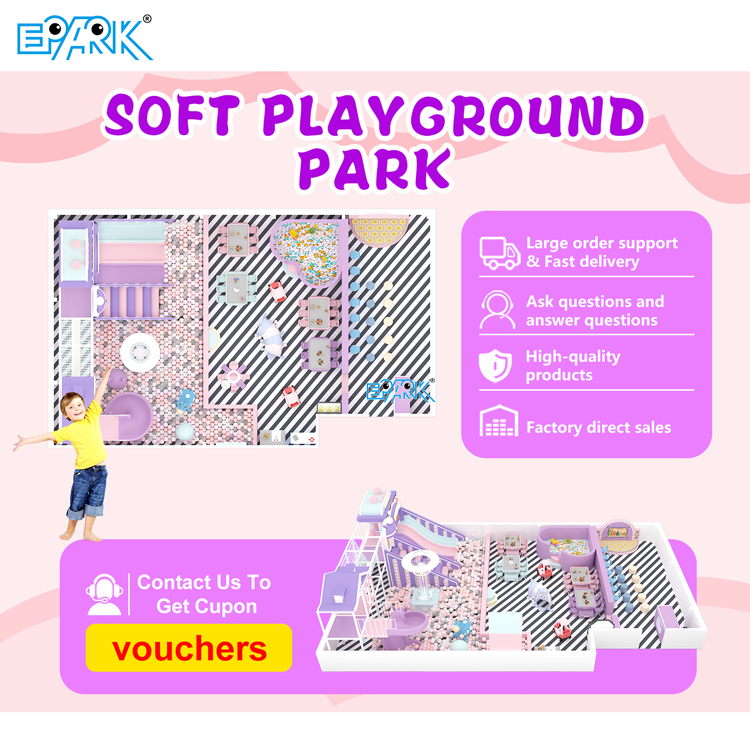
Enhance Customer Experience
Visitors expect clean, safe, and functional indoor playground equipment. Regular maintenance keeps facilities visually appealing and operationally reliable, boosting repeat visits and positive reviews. Studies show that cleanliness and equipment reliability are among the top three factors influencing customer loyalty.
General FEC Maintenance Principles
Daily Inspections
Daily inspections are quick but critical. Staff should visually check all play areas for loose bolts, worn mats, or damaged padding. Even a short daily check can prevent major safety hazards.
Weekly Cleaning & Sanitization
Weekly cleaning focuses on high-traffic surfaces like foam mats, slides, and trampoline mats. Use safe, non-toxic disinfectants that comply with ASTM E2310 standards. This reduces germ transmission and maintains a welcoming environment.
Monthly & Quarterly Checks
In-depth inspections occur monthly and quarterly. Examine frames, bolts, welds, and soft padding. Check trampoline springs, safety nets, and play panels for wear. Record all inspections in a maintenance log to track issues and demonstrate compliance.
Documentation & Reporting
Maintaining detailed logs ensures compliance and operational efficiency. Include inspection dates, staff responsible, items checked, defects found, and corrective actions. This documentation is essential for insurance purposes and B2B reporting.

Soft Play Equipment & Indoor Playgrounds
Surface Cleaning & Disinfection
Soft play surfaces like mats, tunnels, and foam blocks accumulate dust, dirt, and bacteria. Clean these areas with mild detergents or disinfectants recommended by your indoor playground manufacturer. Focus on high-touch surfaces such as handrails and tunnel entrances.
Padding & Foam Inspection
Inspect all foam padding and soft mats for tears, deformation, or exposed inner materials. Damaged padding can violate ASTM and EN safety standards, putting guests at risk. Replace worn components immediately to maintain safety.
Structural Integrity
Check all frames and supports for loose bolts, corrosion, or signs of fatigue. Tighten fasteners using torque wrenches according to manufacturer specifications. Proper structural maintenance ensures the long-term safety of your indoor playground.
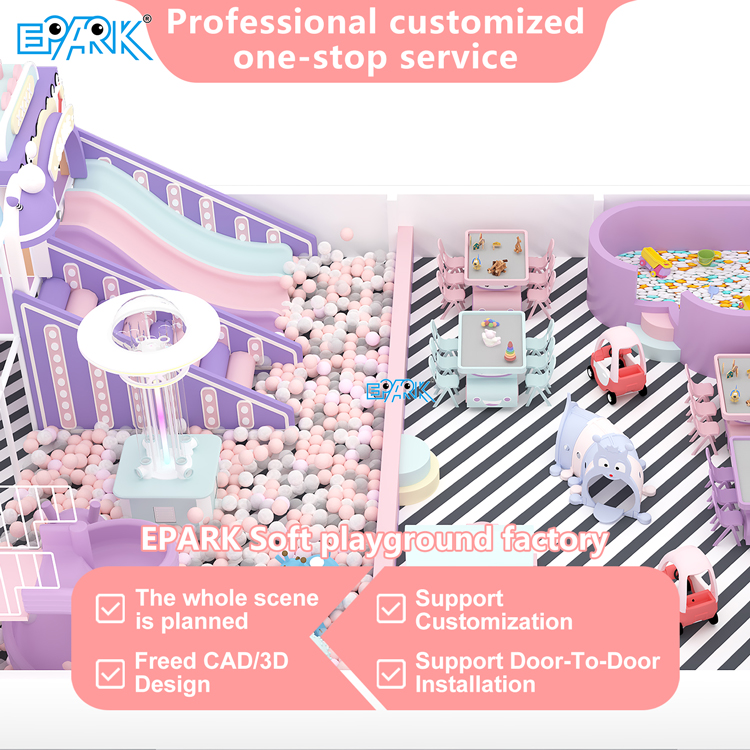
Trampoline Maintenance Best Practices
Mat & Spring Checks
Trampoline mats endure repeated high-impact loads. Inspect for tears, fraying, and loose stitching. Springs should be tensioned correctly and free from rust. Replace any damaged mats or springs promptly.
Safety Net Inspection
Safety nets prevent falls and injuries. Check for holes, tears, and weak stitching. Ensure attachment points are secure and closures function correctly. Safety nets should meet ASTM F2225 standards.
Frame & Joint Stability
Trampoline frames and joints may corrode or loosen over time. Inspect welds, screws, and support bars. Apply anti-corrosion coatings and tighten all fasteners according to manufacturer guidelines.
| Component | Inspection Frequency | Key Checks | Action if Defective |
|---|---|---|---|
| Trampoline mat | Daily | Tears, fraying, stitching | Replace immediately |
| Springs | Monthly | Tension, rust, alignment | Replace rusted or loose springs |
| Safety net | Weekly | Holes, stitching, attachments | Repair or replace |
| Frame & joints | Quarterly | Welds, screws, corrosion | Re-tighten, coat, or repair |
Benefits of Proper FEC Maintenance
Increased Equipment Longevity
Consistent maintenance extends equipment life by 2–3 years, maximizing ROI. Properly maintained trampolines and soft play areas remain functional and safe longer, reducing capital expenditure.
Minimized Liability
A documented maintenance program demonstrates due diligence in safety compliance, reducing legal and insurance risks. Facilities following ASTM and EN standards are better protected in case of incidents.
Higher Customer Satisfaction & Retention
Safe, clean, and fully functional indoor playgrounds attract repeat visits. Well-maintained equipment improves the overall experience and encourages positive online reviews.

Optimized Operational Efficiency
Preventive maintenance reduces unexpected downtime. Scheduled inspections and repairs allow staff to operate efficiently, ensuring continuous revenue and smooth daily operations.
Adhering to FEC maintenance best practices is crucial for safety, profitability, and long-term success. Daily, weekly, monthly, and quarterly inspections, along with proper cleaning, padding checks, and structural assessments, ensure that indoor playgrounds and trampoline parks remain safe, compliant, and enjoyable for guests. Detailed logs, adherence to ASTM and EN standards, and timely repairs protect investments and enhance operational efficiency.
Protect your indoor playground and trampoline park investments today. Contact us for expert FEC maintenance solutions or request a customized maintenance plan tailored to your facility. Ensure your equipment stays safe, functional, and profitable year-round.
General Disclaimer
All data on https://www.eparki.com is for general guidance only. As a leading indoor playground manufacturer and trampoline supplier, EPARK strives for accuracy but gives no express or implied warranty regarding completeness, performance or project fitness. Product specs, designs and results may vary with use and customer requirements. Buyers must verify technical details, compliance and suitability before purchase. EPARK OEM/ODM is not liable for any direct, indirect or consequential damages arising from site use. For custom solutions, contact our manufacturer and supplier team via the Contact page.
Intellectual Property
Text, images, videos, CAD files and software are Guangzhou EPARK Electronic Technology Co., Ltd. All rights reserved. No part may be copied, republished or used commercially without prior written permission. We will pursue legal action for copyright or design-patent infringement.
Trademarks
"EPARK", the EPARK logo and related graphics are registered trademarks of Guangzhou EPARK Electronic Technology Co., Ltd. Unauthorized use in ads, domain names or packaging is prohibited.
Governing Law
These terms are governed by the laws of the People's Republic of China.
Contact
Questions? Email sales@nanyuetech.com or WhatsApp +86 139 0307 9263.

